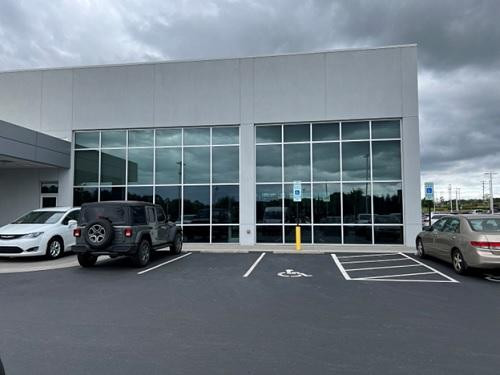
Window tinting is a solution that offers numerous benefits for both businesses and homeowners. However, the requirements and applications of window tinting in commercial and residential settings differ significantly. Understanding these differences is key to choosing the right type of tint for your specific needs.
For business owners considering window tinting for their office or retail space, this article will help you explore the distinctions between commercial and residential tint, focusing on their purpose, materials, installation, and legal considerations.
1. Purpose & Focus
The primary purpose of window tinting differs greatly based on whether it's for a commercial or residential space.
Commercial Tint
Commercial window tint is designed to address the unique needs of businesses. Key benefits include:
- Reducing Glare: By minimizing glare from the sun, commercial window tint helps create a comfortable work environment that improves productivity and reduces eye strain for employees working at computers.
- Enhancing Privacy: Many commercial spaces, such as offices and conference rooms, require increased privacy. Tinting the windows ensures employees and clients feel secure while maintaining an open and modern design.
- Branding Opportunities: Some commercial tints can incorporate frosted or decorative films, allowing businesses to display branding or add aesthetic appeal to their space.
Residential Tint
Residential window tint, on the other hand, is primarily focused on personal comfort and energy efficiency. Benefits include:
- Energy Efficiency: Tints are effective in reducing heat transfer through windows, helping homeowners save on cooling and heating costs.
- Temperature Control: They help maintain consistent indoor temperatures, keeping homes cool during summer and warm during winter.
- UV Protection: Residential tints block harmful UV rays that can damage furniture, flooring, and artwork.
The distinct focus of both types of tinting highlights how their applications cater to their respective environments.
2. Materials Used
The materials used in commercial and residential tinting are crafted with their intended environments in mind.
Commercial Tint Materials
Commercial-grade window tints are typically made from durable and robust materials to withstand the demands of high-traffic areas. These include:
- Metalized or Dual-Reflective Films: Often used due to their high durability and ability to reduce glare and increase privacy.
- Shatter-Resistant Films: Provide an additional layer of security by strengthening the glass against accidental damage or break-ins.
The tints are designed for longevity, ensuring they can endure fluctuations in temperature, frequent cleaning, and constant exposure to harsh sunlight without degrading.
Residential Tint Materials
Residential tints focus on comfort and energy savings. Common materials include:
- Solar Control Films: These are optimized for energy efficiency by blocking a significant amount of heat and UV rays.
- Ceramic Films: Known for their ability to reduce heat without altering the appearance of the windows.
- Decorative Films: Offer stylish solutions for adding privacy to specific rooms, such as bathrooms.
Each material is tailored to improve the homeowner’s living experience by enhancing comfort and protecting home interiors.
3. Installation Process
The installation process for commercial window tinting is more complex compared to residential installations.
Commercial Installation
- Customization: Commercial projects often involve large-scale windows or unique glass designs, requiring customized solutions.
- Expertise: Installations for businesses demand experienced professionals to ensure precision and meet specific objectives such as glare reduction or privacy.
- Time Requirement: The larger surface area of commercial spaces combined with the need for specialized solutions makes the installation process more time-intensive.
Residential Installation
- Simplicity: Residential installations are typically simpler, involving smaller areas and straightforward designs.
- Quick Turnaround: With fewer customizations required, homeowners can often enjoy a faster installation timeline.
- Professional vs DIY: While professional installation is recommended for high-quality results, some homeowners may opt for DIY tints for smaller projects.
Understanding the complexities of installation in commercial settings highlights the importance of hiring skilled professionals for the job.
4. Regulations and Legal Considerations
When installing window tints in any property, it's crucial to consider local regulations regarding tint darkness and reflectiveness, which vary between commercial and residential contexts.
Commercial Tint Regulations
- Reflectivity:
- Commercial tints often have higher reflectivity levels to enhance energy efficiency and privacy.
- Ensure compliance with local laws to avoid excessive glare for neighboring buildings.
- Safety Requirements:
- Some buildings require specific tints that improve safety and meet fire rating standards.
- Permits:
- Certain commercial installations may require permits depending on the placement and material used.
Residential Tint Regulations
- Tint Darkness:
- Local laws may restrict the level of darkness a residential tint can have, primarily to ensure visibility and safety.
- Homeowner Association Rules:
- Some residential communities or HOAs may have guidelines on the appearance or reflectivity of window tints.
- Energy Rebates:
- Depending on the region, homeowners may qualify for energy rebates or tax benefits by installing energy-efficient tints.
Complying with these legal considerations ensures smooth and effective tinting for both commercial and residential properties.
Which Tint is Right for You?
Deciding between commercial and residential tinting depends on your specific needs as a business owner. For offices or retail spaces, focus on commercial-grade tints that offer durability, privacy, and a productivity boost. For homeowners, prioritize energy efficiency and comfort with residential tints designed for temperature control and UV protection.
At the end of the day, the right tint strikes the perfect balance between functionality and aesthetics, ensuring you get the most value out of your investment.
If you’d like expert guidance on selecting the perfect window tint for your property, contact a professional tinting service to learn more about tailored solutions for your needs!
Learn more about Tint USA in Raleigh.